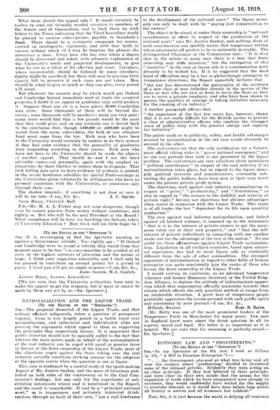NATIONALIZATION AND THE LIQUOR TRADE. [To THE EDITOR Or THE
" SPECTATOR."] SIR,—The proposed decontrol of the Liquor Trade, and that without efficient safeguards, raises a question of paramount urgency. Issue is now largely joined in a battle royal over nationalization, and collectivist and individualist alike are pressing the arguments which appeal to them as supporting the principles they respectively favour. It is important that public attention should now be specially called to the fact that whereas the main points made on behalf of the nationalization of the coal industry can be urged with equal or greater force in favour of the State ownership of the Liquor Trade, most of the objections urged against the State taking over the coal industry actually constitute striking reasons for the adoption of the opposite course when the question is one of liquor.
ThiS view is confirmed by a careful study of the epoch-making Report of Mr. Justice Sankey, and the mass of literature pub- lished on both sides of the controversy as to the Coal Com- mission's findings. Let one only try the experiment of sub- stituting intoxicants where coal is mentioned in the Report, and the result is remarkable. If coal be a "principal national asset," so is temperance, and privately. interested drink- vendors, through no fault of their own, " are a real hindrance
to the development of the national asset." The liquor mono- poly can only be dealt with by " paying just compensation to the owners."
The object to be aimed at under State ownership is "national co-ordination of effort in respect of the production of . the national asset," says Mr. Justice Sankey, and nothing short of such co-ordination can speedily secure that temperance reform whose attainment all profess to be so eminently desirable. The distinguiShed Chairman of the CommissiOn Says: " It is true that in the minds of many men there is .a fear that State ownership may stifle incentive," but the extirpation of this " incentive " in the case of liquor sale is a consummation most devoutly to be wished for. If it be suggested that the dead hand of officialism may be a bar to philanthropic enterprise in temperance directions, the Report appositely declares that. "the war has demonstrated the potentiality of the existence of a new class of men (whether already in the service of the State or not) who are just as keen to serve the State as they are to serve a private employer, and who have been shown to possess the qualities of courage in taking initiative necessary for the running of an industry."
A further paragraph affirms that "the experience of the last few years has, however, shown that it is not really difficult for the British nation to proyido a class of administrative officers who combine the strongest sense of public duty with the greatest energy and capacity for initiative."
The points made as to publicity, safety, and health advantages secured by nationalization in the one case would obviously be secured in the other.
The coal-owners say that the only justification for a Govern- ment official taking risks is " grave national emergency;" and no one can pretend that such is not presented by the liquor problem. The coal-owners are very solicitous about pernicious. " political interference " in respect of the coal industry if its nationalization takes place, but in regard to the liquor mono- poly political interests and considerations, constantly sub- verting the public welfare, have been seen at their very worst under the present private profit system.
The objections used against coal industry nationalization in respect of " price," " productivity," and " distribution," as also in regard to " the menace to the stability and security of private right," become not objections but obvious advantages when stated in connexion with the Liquor Trade. This trade is of all trades the last " dependent for its life upon quantity production."
The case against coal industry nationalization, and indeed against all kindred schemes, is summed up in the statements " that it is to the interest of private owners to get the maxi- mum value out of their own property," and " that the self- interest of private individuals in competing with one another works out for the advantage of the rest of the nation." No ono could use these affirmations against Liquor Trade nationaliza- tion. Legislation in all civilized countries, based upon univer- sal experience, has had to treat liquor sale as essentially different from the sale of other commodities. The strongest opponents of nationalization in regard to other fields of human enterprise can quite consistently join the ranks of those who favour the State ownership of the Liquor Trade. - I would venture in conclusion, as an advanced temperance reformer and former Honorary Secretary of the United King- dom Alliance, to deplore the attitude of indiscriminate opposi- tion which that organization officially maintains towards that reform which affords the only practical method of escape from an intolerable situation. A great host of temperance people gratefully appreciate the course pursued with such public spirit and consistency by your journal.-1 am, Sir, &c.,
[Mr. Batty was one of the most prominent leaders of the Temperance Party in Manchester for many years. Few men in England know more about the drink question in all its aspects, moral and legal. His letter is as important as it is helpful. We are sure that his reasoning is perfectly sound.— ED. Spectator.]


































 Previous page
Previous page